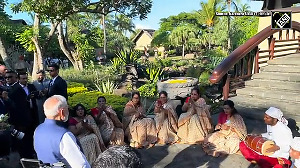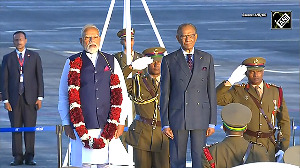According to reliable ex-military sources in Pakistan, at the meeting of the Corps Commanders of the Pakistani Army convened by President General Pervez Musharraf on November 10, there was an unanimous endorsement of his decision to impose emergency, suspend the Constitution and sack Chief Justice Iftikhar Mohammad Chaudhury.
However, the majority of the commanders expressed their reservations over the wisdom of his attempts, under US pressure, to reach a power-sharing agreement with Benazir Bhutto. Their reservations were based on the following grounds:
Before 1988, Al Zulfiquar, the organisation headed by her brother, the late Murtaza Bhutto, was responsible for the killing of Punjabi political leaders perceived by it as close to the army. They recalled in particular its alleged role in the assassination of Chaudhury Zehur Elahi, who was very close to General Zia-ul-Haq and related to Chaudhury Shujjat Hussain, the leader of the pro-army Pakistan Muslim League (Qaid-e-Azam) and Pervez Elahi, the chief minister of Punjab.
The PML (QA) has remained loyal to Musharraf and the army for the last five years and supported him in all his actions -- whether it be against Chaudhury or for the imposition of the emergency. To succumb to US pressure to facilitate the return of Benazir to power would be extremely unfair to the PML (QA) and Musharraf might end up by losing the support of the Punjabi political class, the religious fundamentalist parties and the Muttahida Qaumi Movement of Altaf Hussain.
The dissenting commanders expressed their resentment over what they projected as the US attempts to interfere in the internal political affairs of Pakistan by backing Benazir. They said that while Pakistan should continue to co-operate with the US in the operations against Al Qaeda and pro-Al Qaeda terrorist groups, it should resist US pressure to reach a power-sharing agreement with her.
They also expressed resentment over the kind of allegations she has been making against the Inter-Services Intelligence and serving and retired officers in the intelligence community ever since she returned to Pakistan on October 18.
They were of the view that at a time when the fundamentalist political parties and jihadi organisations were expressing their opposition to Benazir becoming the prime minister again, to give her share of the power under US pressure would aggravate the difficulties already being faced by the security forces in countering the upsurge in terrorism since the raid on the Lal Masjid in July.
They were also of the view that Musharraf should not be in a hurry to lift emergency. They wanted it to continue till the elections were over and a new government was in position. They were afraid that in the absence of the emergency, she and her followers in the Pakistan People's Party might use their considerable money and street power to create political instability if her party did not do well in the elections.
Following this, Musharraf has been evasive on the question of an early end to the emergency. He has started projecting Benazir as one among the many political leaders of Pakistan instead of the first among the political leaders as she is fond of projecting herself. The corps commanders wanted her to be cut down to size.
The writer is additional secretary (retired), cabinet secretariat, government of India, New Delhi, and director, Institute For Topical Studies, Chennai. e-mail: seventyone2@gmail.com.







 © 2025
© 2025